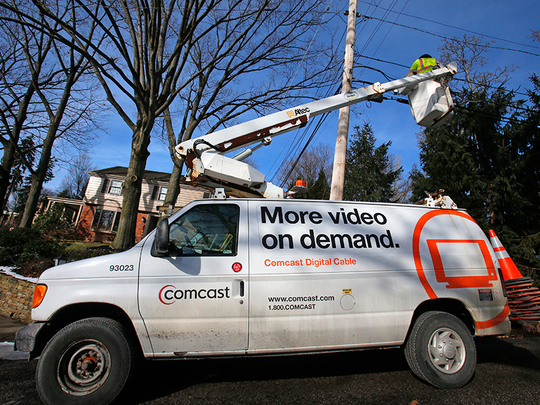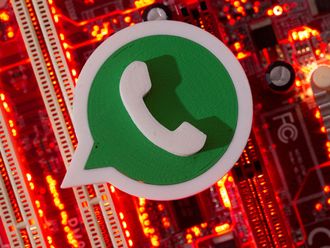
New York: The staff lawyers at the Justice Department reviewing Comcast’s proposed $45 billion (Dh165 billion) takeover of Time Warner Cable have raised concerns about the merger and are leaning toward recommending that it be blocked, according to a person with knowledge of the deliberations.
The development represents only a preliminary step, and senior Justice Department officials could overrule any recommendation from their staff lawyers.
Announced in February 2014, the merger between Comcast and Time Warner Cable would unite the two largest cable operators in the US, controlling just under 30 per cent of the country’s pay television subscribers. It also would control an estimated 35 to 50 per cent of the nation’s broadband internet service, depending on how regulators defined the market.
The Comcast-Time Warner Cable merger has faced intense scrutiny at both the Justice Department, which is reviewing whether the deal would harm competition, and the Federal Communications Commission, which is evaluating whether the deal is in the public interest. The legal rationale for why staff lawyers think that regulators could make a case that the deal is anti-competitive is unclear.
In a sign that the discussions are continuing, neither company nor their lawyers have received signals that the deal would be blocked. Staff lawyers routinely float concerns about a deal, but ultimately approve the deal with some conditions. Early objections against a deal can serve as a negotiating tactic to get a company to come to the table.
Comcast has not yet started negotiations with regulators about potential conditions to place on the deal, according to one person with knowledge of the discussions. Even if regulators blessed the merger, they could demand arduous conditions from Comcast, like having to divest more subscribers. If that occurred, Comcast could walk away from the deal, which has no break-up fee.
Multiple television executives who do business with the two cable giants said that they have been in frequent communication with regulators during the review process, and that in recent days government lawyers have narrowed their line of questioning.
That has led them to think that the agency is attempting to uncover evidence that would shore up their argument for why the deal would be anti-competitive.
One specific question asked was whether Comcast and Time Warner Cable compete with the television companies to distribute programming to consumers. Networks like HBO and CBS, for instance, recently introduced new internet streaming services that offer access to their content without a traditional cable subscription.
The staff lawyers will ultimately present their recommendation to the senior officials in the Justice Department’s anti-trust division. In this instance, though, William J. Baer, who leads the anti-trust division, is recused from the case. When Baer was in private practice, he worked on the Comcast acquisition of NBCUniversal.
Sena Fitzmaurice, a Comcast spokeswoman, said in a statement, “there is no basis for a lawsuit to block the transaction.”
“The Comcast/Time Warner Cable transaction will result in significant consumer benefits — faster broadband speeds, access to a superior video experience and more competition in business services resulting in billions of dollars of cost savings,” Fitzmaurice said. “These benefits have been essentially unchallenged in the record — and all can be achieved without any reduction of competition.”
Bobby Amirshahi, a Time Warner Cable spokesman, said that the company has had no indication from the Justice Department that the deal would be blocked. “We have been working productively with both DOJ and FCC and believe that there is no basis for DOJ to block the deal,” he said.
News that the Justice Department was considering blocking the merger was first reported by Bloomberg News. The shares of both companies dropped on the news, with Comcast declining 2.6 per cent and Time Warner Cable falling 5.4 per cent.
If approved, the merger would reshape the country’s television and broadband infrastructure. Other deals hinge on the merger’s approval, including Charter Communications’ $10.4 billion bid for Bright House Networks that would ultimately create the nation’s second-largest cable operator.
Media executives and public interest groups have raised concerns that an enlarged Comcast would have too much power over the future of the internet and television. Among the fears are that Comcast would use its extra heft to force consumers to pay more for declining service and to push around internet companies and TV networks, stifling innovation and diversity of programming.
“There’s no question is my mind that this deal is anything other than blatantly anti-competitive,” said Michael Copps, a former Democratic member of the FCC and a special adviser to the Common Cause public interest group. “It fails not just the anti-trust metrics, but the public interest metrics, too.”
When announced, some thought few questions would be raised about whether the deal would be blocked because Comcast and Time Warner Cable do not compete against each other for customers in local markets. That sense of inevitability has declined in recent months and some analysts have lowered their odds that the deal goes through.
Comcast recently said that it expected government regulators to complete their review of the deal in the middle of the year. Previously, the company had expected the deal to close in early 2015.
The Justice Department has no firm deadline to make a decision. The FCC had an informal schedule to rule by the end of March, but has extended that.











